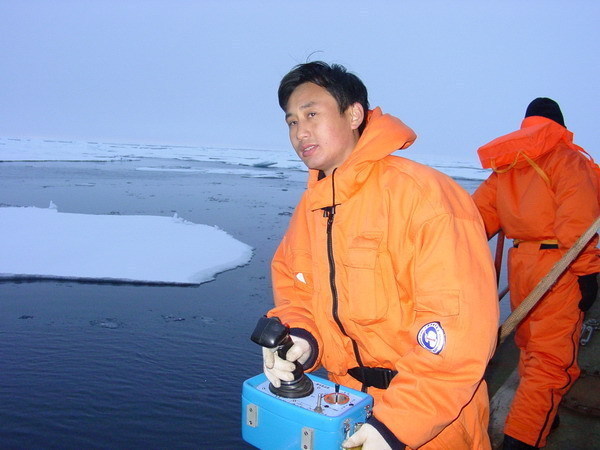New icebreaker to improve China's polar research
Updated: 2011-11-04 07:57
By Wang Qian (China Daily)
|
|||||||||
|
 Li Zhigang manipulates a robot during an Arctic expedition in 2003. [Photo/provided to China Daily]
|
FIRST PERSON LI ZHIGANG
Of bears and a birthday
Editor's note: Li Zhigang is a research professor with the State Key Laboratory of Robotics at the Shenyang Institute of Automation, under the Chinese Academy of Sciences.
When the vessel entered the Arctic Circle, the whole world suddenly turned white.
It was eight years ago, but I can still vividly remember the excitement when I traveled with the Arctic scientific expedition team in 2003.
It was only the second time China had ever sent a team there, and the first one using a drone that can work under water on the Xuelong research ship.
I was in charge of testing and operating the equipment, designed by the Shenyang Institute of Automation. Actually I spent most of my time doing other jobs: looking out for polar bears, fixing machines for other people and carrying heavy instruments as other scientists conducted experiments.
More than 100 experts were on the boat, ranging from those in glaciology, meteorology and biology to geophysics and environmental sciences. We were like a big family; everyone shouldered equal responsibility.
To cope with the dangers, each research mission was given a time limit, and people who did not have experiments to conduct had to help others who did. For example, I'm good at dealing with machines, so people come to me when their equipment doesn't work. A geographer may understand how to use his equipment, but he may not be so clear about how to fix it.
One of the most common jobs was watching out for bears.
Once a group of meteorological researchers were conducting experiments on a piece of floating ice when a polar bear approached. "Run," we shouted. One of them almost fell into an ice hole, which could have killed him. The five team members rushed into the helicopter. The pilot took off and hovered for a while until it scared the bear away.
On the second day I went back to the location to check - the bear's footprint was twice as big as mine. Scary.
All of us were taught how to use a gun before we set out, but I sometimes would take a bayonet in case I forgot how to shoot when I saw a bear.
Although each of us was from different institutes and did not know each other at the start, we built a tight relationship during the research and have since kept in touch.
I even celebrated my 33rd birthday in the North Pole.
Li Zhigang was talking to China Daily reporters Cheng Yingqi and Liu Ce.











